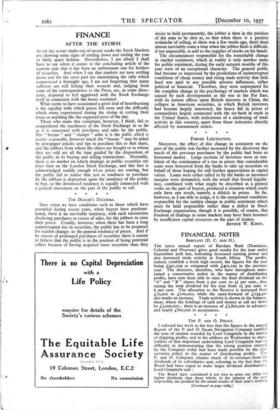* * * * FORCED LIQUIDATION.
Moreover, the effect of this change in sentiment on the part of the public was further increased by the discovery that much of the previous purchases by the public had been on borrowed money. Large sections of investors were so con- fident of the continuance of a rise in prices that considerable sums were borrowed from the banks to take up securities on behalf of those hoping for still further appreciation in capital values. Loans were either called in by the banks or increased margins 'were demanded, with the result that forced liquida- tion, combined with what Might be described as a general strike on the part of buyers, produced a situation which could only have one result, namely, a clibilde in prices. So far, however, as I am able to judge it is the exceptional conditions responsible for the sudden change in public sentiment which must be held responsible rather than a defect in Stock Exchange organisation, though it is possible, of course, that freedom of dealings, in some markets may have been lessened by insufficient capital resources on the part of dealers.
ARTHUR W. KIDDY.






















































 Previous page
Previous page